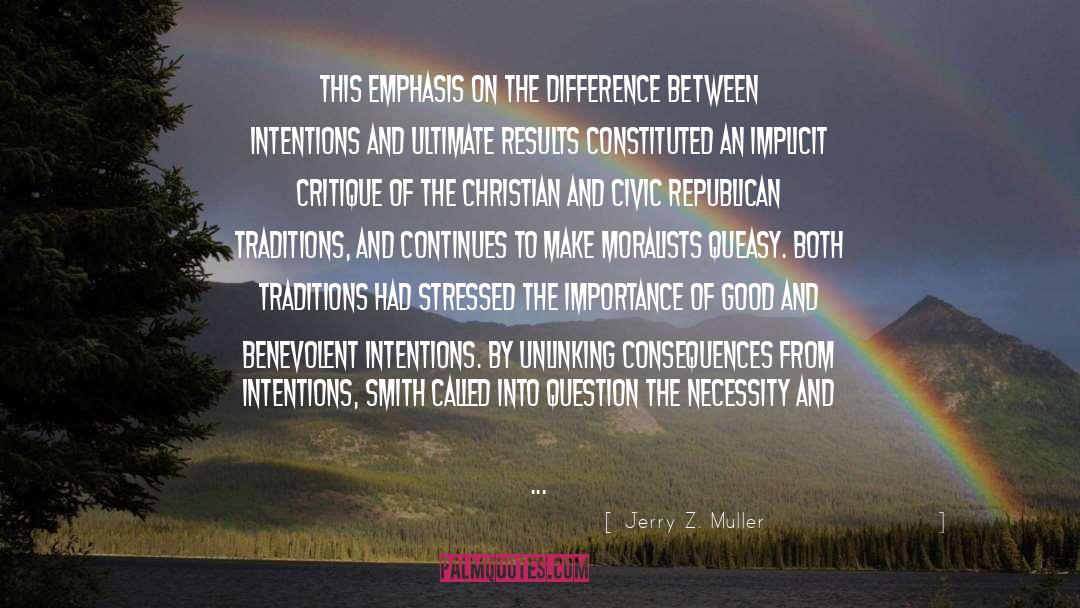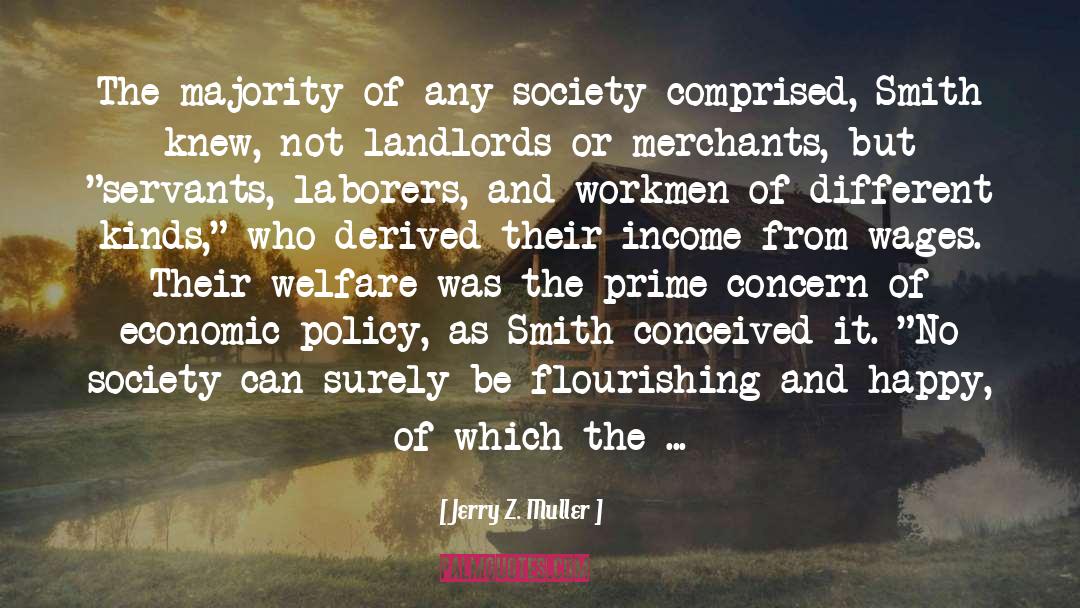Jerry Z. Muller Famous Quotes
Reading Jerry Z. Muller quotes, download and share images of famous quotes by Jerry Z. Muller. Righ click to see or save pictures of Jerry Z. Muller quotes that you can use as your wallpaper for free.
It is all very well to have some internal sense of oneself as an individual, but that sense must correspond to an external reality. Part of that external reality is property. The fact that something belongs to me and not to everyone increases my sense of myself as someone in particular. For Hegel that sense of individual particularity is intrinsic to the modern moral order. Indeed "the right of the subject's particularity to find satisfaction, or
to put it differently
the right of subjective freedom, is the pivotal and focal point in the difference between antiquity and the modern age." The fact that others do not take my property
that they regard it as mine
is also a way in which they recognize me as an individual. It is precisely this recognition that the slave, the bondsman, and the serf lack. That the right to own private property, to control some corner of the world, is universal in the modern state is for Hegel part of its glory. (p. 155)

To realize the Enlightenment ideals of formal equality, the rule of law, freedom of commerce, and religious toleration, Voltaire and many of the other philosophes looked to absolutist monarchs, whose policies they hoped to influence. The support of the philosophes for the expansion of the monarch's sovereign power was tactical. It arose not out of a principled belief in the throne, but out of the recognition that only a strong monarchy had the power to override the resistance to enlightened legislation by the privileged churches, estates, and corporations that made up continental European society. (p. 45)

Capitalism is too important and complex a subject to be left to economists. Achieving a critical comprehension of it requires perspectives beyond those characteristic of modern economics. That is why this is a history not of economic ideas, but of ideas beyond the capitalist economy.

This emphasis on the difference between intentions and ultimate results constituted an implicit critique of the Christian and civic republican traditions, and continues to make moralists queasy. Both traditions had stressed the importance of good and benevolent intentions. By unlinking consequences from intentions, Smith called into question the necessity and possibility of elevating the economic behavior of individuals through preaching and propaganda.
Yet just as he transmuted the Christian virtue of charity into the secular virtue of benevolence, on another level Smith preserved the classic republican concern for the common good. Those who could be motivated to devote themselves to promoting the public interest were in need of superior reason and understanding, by which we are capable of discerning the remote consequences of all our actions, and of foreseeing the advantage or detriment which is likely to result from them.

Central to Möser's view of the human world was "honor," a notion that was as important to corporatist society as the notion of dignity would be for the more individualistic society that succeeded it. In Möser's view, a person acquired his identity from his place in the institutional structure of society, a society in which economic, social, and political institutions were not distinguished from one another. His status (as a guildsman, noble landowner, serf, or independent peasant cottager) determined not only how he earned his living, but his sense of who he was, of what his duties and obligations were, of those to whom he ought to defer and those who ought to defer to him. (In the language of modern sociology, Möser's society was one in which almost all of the individual's roles derived from a single status.) Who one was was largely a continuation of what one's forebears had been. For Möser the real self was the socially encumbered self, the self based on status, on historical and regional particularity, and on property. It was a self whose prime virtue was honor. Status and the honor that attached to it were inherited, although they could be lost if one failed to live up to the duties of one's rank.

The majority of any society comprised, Smith knew, not landlords or merchants, but "servants, laborers, and workmen of different kinds," who derived their income from wages. Their welfare was the prime concern of economic policy, as Smith conceived it. "No society can surely be flourishing and happy, of which the far greater part of the members are poor and miserable," he wrote. "It is but equity, besides, that they who feed, clothe and lodge the whole body of the people should have such a share of the produce of their own labour as to be themselves tolerably well fed, clothed, and lodged." The chief economic concern of the legislator, in Smith's view, ought to be the purchasing power of wages, since that was the measure of the material well-being of the bulk of the population. (p. 64)

Yet despite...accommodations with commerce, Möser regarded the market as primarily a threat--to the artisanal citizens of the town, to the traditional wants of the peasantry, and to the political structure to society, since it created a growing class of people outside the traditional paternalistic relations of the countryside. Möser's conception of contemporary political and economic trends in Osnabrück was essentialy tragic and tinged with that idealization of the past that would later be called romantic. Möser's heroes were the artisan-citizen and the independent peasant, his villains the shopkeeper and the peddler.

An Inquiry into the Nature and Causes of the Wealth of Nations, which Smith published in 1776, is the most important book ever written about capitalism and its moral ramifications. Though The Wealth of Nations is in good part about commerce, it was not written for businessmen or merchants. A book focused on the analysis of market processes motivated by self-interest, it was written by one of the most admired philosophers of the Enlightenment, a former professor of logic, rhetoric, jurisprudence, and moral philosophy, in order to influence politicians and rouse them to pursue the common good.

Burke's admonition
"The effect of liberty to individuals is, that they may do what they please: We ought to see what it will please them to do, before we risk congratulations"
never seems to have occurred to Hayek. The Arnoldian ideal of the disinterested intellectual willing to criticize one side and then the other in order to create balance and counteract the one-sidedness that led toward fanaticism: That, too, was as alien to Hayek as it had been to Marcuse. If it was partisanship that led Hayek to push forward intellectually to new insights, it was also partisanship that kept him from a balanced and rounded philosophy.
Perhaps a familiarity with "the best that has been thought and said" about the market will aid us in obtaining a more disinterested and informed perspective. Such a perspective might well begin with Hayek's insights. But it would by no means end with them. p. 387

Arnold's notion of the intellectual as disinterested critic distinguished him from both Marx and Hegel. For Marx, the proper function of the intellectual was to be a partisan on behalf of the proletariat, criticizing bourgeois society for its fundamental, structural oppression. For Hegel, the role of the intellectual was to stand above particular group interests, and to bring to consciousness the ethical basis of modern, capitalist society, in the process creating standards by which to guide politics and culture. Arnold's conception of "aliens" has obvious affinities with this Hegelian image of the intellectual. But "disinterestedness" for Arnold had a rather different meaning. It implied the ability to free oneself from partisanship, to take a distanced enough view to be able to criticize the side of the issue to which one had been committed, as circumstances required. "Living by ideas" he wrote, means that "when one side of a question has long had your earnest support, when all your feelings are engaged, when you hear all around you no language but one, when your party talks this language like a steam-engine and can imagine no other--still to be able to think, still to be irresistibly carried, if so it be, by the current of thought to the opposite side of the question..." The role of the intellectual, then, was to embody and encourage that quality of mind that allowed individuals to get some distance from their social, political, and economic milieu; to reflect critically,

It was in the eighteenth century that England became what (Adam) Smith called "a nation of shopkeepers" ... (p. 58)

